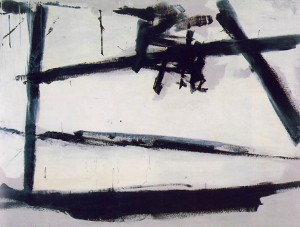Dressing Up Maggie Nelson
 I first became of aware of Maggie Nelson when I overheard two feminist girls debating whether or not what “she was doing” was ethical. I did not know what “she was doing,” nor did I care. I was forbidden to read her. She was a girl, and for quite a bit it was against the law for me to read girl poets besides, of course, Sylvia. The ban against girls began when a teacher (another feminist, and certainly not the catty, commendable kind) assigned us the Sharon Olds’s poem “The Language of the Brag.” The poem perpetuates the base boast: “I have done what you wanted to do, Walt Whitman, / Allen Ginsberg, I have done this thing.” Oh bother! A demographic whose primary goal is to be like two hairy free-verse guzzling perverts will elicit neither esteem nor heed from me. But then another teacher (a boy one) suggested I read Ariana Reines. Ariana isn’t an intolerably gregarious gay and she isn’t a beatnik-hippie sodomite. Ariana is a monster. In one poem in The Cow, she munches her own poop, sips her throw up, and goes down on herself. She is “self-contained”: disciplined and exacting. She is a sword-sharp: the antithesis of the free verse commoners who are as loose and watery as Barack H. Obama’s negotiating skills.
I first became of aware of Maggie Nelson when I overheard two feminist girls debating whether or not what “she was doing” was ethical. I did not know what “she was doing,” nor did I care. I was forbidden to read her. She was a girl, and for quite a bit it was against the law for me to read girl poets besides, of course, Sylvia. The ban against girls began when a teacher (another feminist, and certainly not the catty, commendable kind) assigned us the Sharon Olds’s poem “The Language of the Brag.” The poem perpetuates the base boast: “I have done what you wanted to do, Walt Whitman, / Allen Ginsberg, I have done this thing.” Oh bother! A demographic whose primary goal is to be like two hairy free-verse guzzling perverts will elicit neither esteem nor heed from me. But then another teacher (a boy one) suggested I read Ariana Reines. Ariana isn’t an intolerably gregarious gay and she isn’t a beatnik-hippie sodomite. Ariana is a monster. In one poem in The Cow, she munches her own poop, sips her throw up, and goes down on herself. She is “self-contained”: disciplined and exacting. She is a sword-sharp: the antithesis of the free verse commoners who are as loose and watery as Barack H. Obama’s negotiating skills.
Obviously after I discovered Ariana and the rest of Rebecca Wolff’s spitfire songstresses my ban against girl poets had to be banned. This meant I could finally read Maggie, which turned out to be marvelous. Maggie is obsessed with ghastliness, terror, and the dead. She devotes “years of compulsion, confusion, and damage” writing about her Aunt Jane, a girl who was viciously murdered while returning home from college. Moreover, she’s compelled by one of the most blessed, articulate, and mischievous girls to ever be forced to live on earth… Anne Frank! “But who can guess / what Anne would have said / about the last place she went,” Maggie tantalizes. Indeed, Maggie has outstanding tastes and curiosities, so I will provide her with three outfits so that she feels fabulous in her wonderfully horrific world.
The Whole Thing About Poetry
 At the Juniper Festival a few weeks ago there was a panel about The Future of Poetry. The panelists were Evie Shockley, Cathy Park Hong, Heather Christle and Rebecca Wolfe. It was good, cutting edge, perhaps too polite but definitely the sort of thing that is supposed to happen at panels.
At the Juniper Festival a few weeks ago there was a panel about The Future of Poetry. The panelists were Evie Shockley, Cathy Park Hong, Heather Christle and Rebecca Wolfe. It was good, cutting edge, perhaps too polite but definitely the sort of thing that is supposed to happen at panels.
Rebecca Wolff said poetry doesn’t matter and it sucks that poets, who are smart and engaged people, are wasting their lives on something cloistered and anonymous (my words) when they should become civil servants, business people, people who can make a difference. Essentially, the world is missing the poet’s perspective in areas where they are needed.
I could be paraphrasing this in an unacceptable way, just so you know. But that was the gist. READ MORE >
“Have your own fun.”
 Finally having got a hold of the beautiful latest issue of Fence, I was struck–[before being struck by the words of the pieces, as usual, and by their new colored layout on the page in this issue in a combo of blue/black/gray that I wish more publications would take on]–in reading Rebecca Wolff’s editor’s note. The note concerns itself mainly with an email that she received about an announcement for Brandon Downing’s brand new, and by and large tough to nail down, Lake Antiquity.
Finally having got a hold of the beautiful latest issue of Fence, I was struck–[before being struck by the words of the pieces, as usual, and by their new colored layout on the page in this issue in a combo of blue/black/gray that I wish more publications would take on]–in reading Rebecca Wolff’s editor’s note. The note concerns itself mainly with an email that she received about an announcement for Brandon Downing’s brand new, and by and large tough to nail down, Lake Antiquity.
The emailer was bitching at Ms. Wolff for calling the book ‘indescribable’ and then simultaneously going on to try to describe it. The emailer apparently thought the book wasn’t as indescribable as she thought it was, and gave his take on how she should have described it. Bitching at her for being in awe of something, and not knowing exactly how to say why. She responds and then takes the consideration of the person’s email as a chance to open up the consideration of her editorial stance, which struck me as so right and crucial that I am going to copy the heart of it right here:
As a publisher, I often find myself in the position of ushering texts into the world that are, frankly, over my head in terms of their erudition or the richness of the literary-historical medium in which they grew–most of the poets I publish have read more than I have, and my appreciation of their work is made up of some combination of savvy (“this work is smart, and, in its position in the literary landscape, is something I feel comfortable being connected to”), curiosity (“I will learn something through the process of putting this book out in the world”), and whatever one calls the kind of literary/aesthetic appreciation that happens DESPITE or IN SPITE OF a kind of glancing or even glib awareness of the aforementioned richesses.
Thank god. A publisher of renown, with a backlog of amazing publications, who understands and can be plain about the idea that an editor, publisher, whoever, need not understand the full breadth or even the full context of the body of work they help bring into the light–beyond simply knowing that it is something of power, worth spreading. If there is anything that plagues the magazine and book publishing industry, it is too wide a margin of people denying that which they do not understand, or can encapsulate, and thereby disallowing themselves to be altered or even expanded by the work, in working harder at it, in letting it open up around them. Is this not what we read for? Is this not what we write for? Are books just another mode of entertainment, continuity, or are they meant to do something more?
This is why many magazines are dying. In something as often ephemeral as an issue of a magazine, why shouldn’t more chances be taken? In something as historically struck as publishing a book, why shouldn’t it be something that lives beyond its grasp? So many magazines and publishers fail financially because first they fail to enthrall, because their contents are bound in breadth enough that they are forced to compete for attention by things like movies, and often wheel around the elements that make text capable of approaching, creating space untouchable by another medium.
If only more editors would be more frank and open and willing to open the gates some, to smudge lines and make things that we can take beyond mere emotional responses and momentary pleasures, and instead create a body that more often interacts on the level of the unnamable, the waking, the eat. The day there are no objects left that we do not understand is the day we begin only ever getting smaller, dumber. Bodies in a stall.
>>>>>> Intuition over containment.
>>>>>>> Prowess over cake.
>>>>>>>>>>> Resonance over immediacy.
>>>>>>>>> ‘What the fuck’ over ‘Oh, neat.’
Pick up the new issue to read the thing in full, it’s worth the price alone, not to mention a ton of other magick words.
Bravo Rebecca. I want to have your kind of fun, too.
